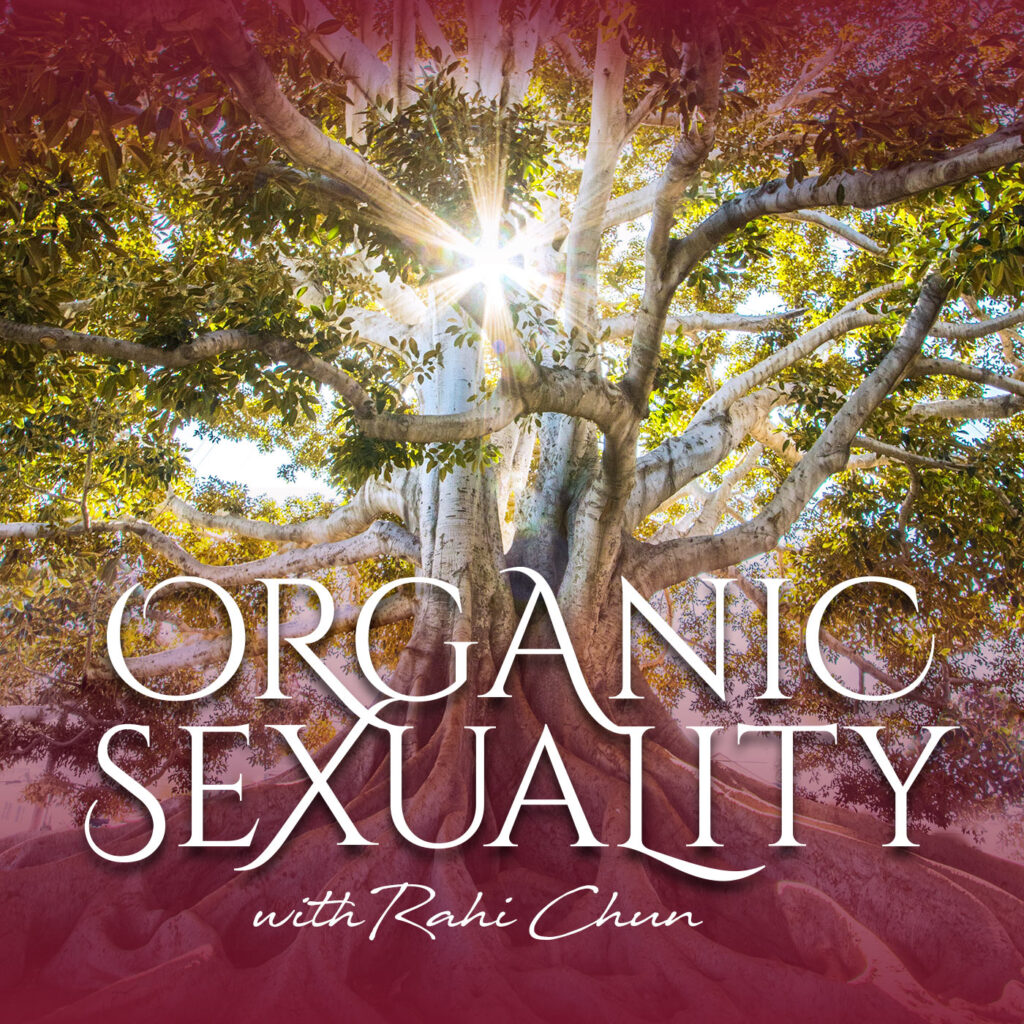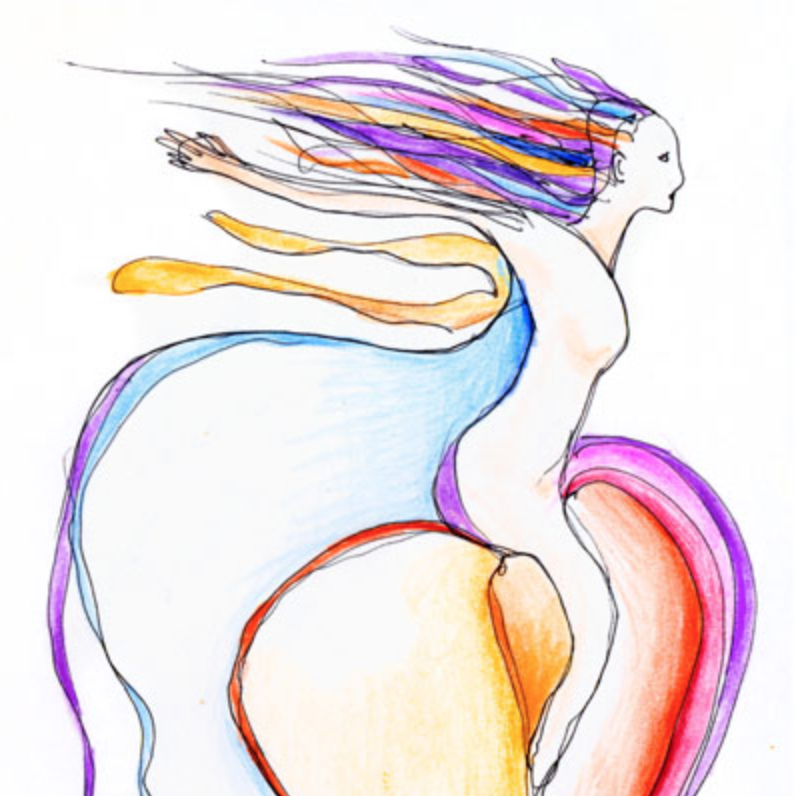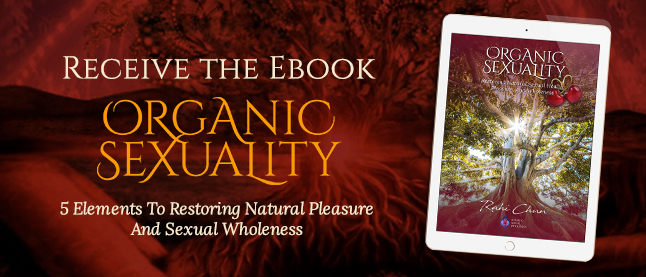
How to Restore Empowering Associations with Sexual Pleasure and Release Unhealthy Wiring
Share this episode:
Just as our initial touch imprints and the ways our touch receptors develop play a significant role with our later touch patterns, so too are our early sexual imprints significant, especially when they are associated with strong emotional experiences. Today’s special guests, Kimberly and Nina, both former clients, share in great detail the experiences of their early sexual imprints, how these influenced their teen and adult intimacy patterns, and what they feel were the significant keys for releasing these from their tissues and cellular memory.
Kimberly, a healer with a deep understanding of neuroscience and somatic sexology, shares her insights from the perspective of a child being pleasured by her beloved baby-sitter, and its affects on her embodiment and later sexual behavior and patterns. Nina shares the association of her innocent self-pleasuring at age 5 with the hostile response by her beloved father, and how this image and experience followed her into adulthood, affecting her sexual embodiment and pleasure. Both also share their processes for releasing these past patterns and what they each feel allowed for a re-patterning of their healthy sexual nature with pleasure, freedom and goodness.

Medium.com Article by Kimberly detailing her 4 sessions.
For Spiritual Alchemy Sessions, contact Kimberly at kimberlycooperstudio@gmail.com
We explore:
“When I’ve gone back to that pure place of who I was as a five-year-old child… being shown something, much like you would be shown – eat your brussel sprouts or go to bed on time… I look back at feeling loved by somebody…. by somebody that I trusted and adored and was kind of a role model and who I actually felt, when she lavished attention on me… I was being pinpointed for something special. So that was where the confusion came in is that I was feeling pleasure and love and adoration and attention from somebody which wasn’t appropriate. But I did not know that at the time. So I was just feeling the feelings…And the reason it takes so many years to unravel is that it was a pure pleasure experience at the time…” – Kimberly
How the somatic wiring of desired attention with sexual pleasure can lead to teen-age and adult sexual engagement absent of a courtship phase.
How the overwhelm of sexual voltage a child experiences from an older abuser can lead to the nervous system seeking out similar overwhelming experiences, especially when this involved associations with pleasure and love.
How Kimberly’s conscious choice of doing the inner work of cultivating self-intimacy manifested an outer relationship of true intimacy, and how the safety and resource of this real intimacy in turn, deepened her own self intimacy with herself in her self-pleasure.
How challenging it can be for survivors of abuse to feel safe to receive, and yet how doing so in a consensual setting can lead to integrating uncomfortable embodied emotions of past traumas for its alchemy and transformation.
“When I think back, I still had his angry look… it was somehow in my body. And when, during the session he left,… I allowed myself to have pleasure without this angry look in my mind… I remember that you asked me, ‘how do you feel now that your father left?’ .. And I remember that I said – sad and free.” – Nina
How a childhood association of sexual pleasure with the shame and anger of her beloved Father, influenced Nina’s disconnection from feeling embodied sexuality into her adult years.
How re-imprinting a masculine authority figure with permission, acceptance and a celebration of sexuality can replace past associations with a paternal figure.
How past associations of sexual pleasure wired with a parent’s disapproval can couple sadness with orgasm, and how releasing this from the body can lead to orgasms associated with pleasure, goodness and wholeness.
Rahi: Welcome to Organic Sexuality, where we explore the restoration of pleasure, the reclamation of sexual sovereignty and the realization of our embodied sexual nature - an Invitation to honor the pleasures of your body by embodying the pleasures of your nature. I'm your host, Rahi Chun. I'm a certified Somatic Sex Educator, Sexological Bodyworker and creator of Somatic Sexual Wholeness. Early sexual arousal and pleasure imprints from childhood can create powerful adult intimacy patterns and behaviors, regardless of how healthy or unhealthy they may be. How can we release unhealthy coupling with sexual pleasure from the body's tissues and cellular memory, and recondition healthy, expansive, and empowering pleasure patterns. Today's episode invites two very special guests, Kimberly and Nina, who shared generously and courageously their experiences of having childhood sexual pleasure wired with unhealthy associations, how this coupling affected their teen and adult intimacy patterns, and how these were uncoupled and reimprinted with new, healthy, and empowering associations. : Kimberly shares how as a child receiving attention, which came in the form of being sexually pleasured by a babysitter, created an association between desired attention and sexual engagement, and how this affected her intimacy patterns into adulthood. A healer herself with great insights into the neuroscience of sexuality, she helps us understand her perspective as a child of having fun with her babysitter, and the journey she's taken to release these past patterns from the tissues of her body, resulting in the freedom to feel new expansive pleasures, sensations, and associations. Rahi: I'd love to start by asking you about your childhood experiences and what you made sense of those experiences as a child, because I think as adults we're always super-imposing or interpreting what that it might be or must be like for a child, but a child's sense of awareness and their place in the world is so different than, you know, later on. And I'm wondering if you go back to those, how did you make sense of those early experiences? Kimberly: Well, that's a really loaded question. And it's something that I've been thinking about for many years, because as you just said, we do think about things in retrospect, when we have a certain amount of knowledge and information about it in later years. But when I've gone back to that pure place of who I was as a five-year-old child, which was the age when I remember, I first remember abuse, I can tell you a couple of things. One thing is that I was just a completely innocent being, being shown something much like you would be shown, eat your brussel sprouts or go to bed on time, or this is what we do on Sundays. I had a babysitter who was a female who clearly I know now had abuse in her life and she chose to act out abuse on my sister and I, and she was a very trusted babysitter. Kimberly: Someone who we actually looked up to. So when I think about the pure aspects of the abuse unfettered, by what I know as an adult, I look back at feeling loved by somebody feeling like I was being paid attention to specially by somebody, by somebody that I trusted and adored and was kind of a role model and who I actually felt when she lavished attention on me, I was being pinpointed for something special. So that was where the confusion came in is that I was feeling pleasure and love and adoration and attention from somebody which wasn't appropriate. But I did not know that at the time. So I was just feeling the feelings. And so I learned the sort of place where I had pleasure and attention, which later I would find out was not appropriate. But in that moment as a child, at the time, it was hitting the pleasure points of me that I wasn't getting from my mother or I wasn't getting from the normal foundation that children are supposed to get to feel safe and loved and secure. So I kind of started to equate the feelings I had with this babysitter, with what I think other people would consider to be loved. Rahi: Yeah, Kimberly, what you're sharing I think is so profound and real and needs to be underscored that all children, well, I mean, it sounds like in your situation, there was a, like an emotional pleasure that was associated with the physical interactions with this authority figure that was trusted and loved by you, your sister, and I'm guessing your caretakers as well. And so it was seen as lavishness, as loving attention - as love. Kimberly: Yeah. We, my sister was involved too, and we actually came to later discuss this and think about it. And the way that we were positioned in the abuse, obviously from the perpetrator's view was I'm just doing this because this is what I've been taught. From our perspective, it was - this is someone lavishing love and adoration on us and making this feel pleasurable too. So the first dose of feeling pleasurable that we got was in this aspect. And when you don't know if it's wrong or not, you just feel pleasure. And you're like, oh, this is pleasure, right? Problems come later when you realize that's not supposed to be the pleasure you were feeling at the time. And that's when all of the stuff starts. But at the time we just felt like we were being involved in this game with this person we loved and adored. And so we didn't know there was anything wrong with it. We actually were pretty in touch with our own pleasure in our body at a very young age. We had no idea that it was wrong, you know, until you get the mental notion of what's really going on, you don't have any kind of judgment related to it. So it was very much attached to our only sense of being loved in a family and in an environment where we didn't really get that that much because our parents were completely distracted by their own neurosis. Rahi: That's also an important point to underscore is that as children, when our parents or caretakers are very preoccupied or feel unavailable physically and or emotionally, you know, the innocence of children is going to long and yearn for that kind of quality attention that we're all wanting as children. And when it's given by someone who is trusted and who is looked up to, it's going to feel great. I'm curious, Kimberly was the physical nature of the abuse -was there any kind of force or pain or discomfort involved or was it pure pleasure? Kimberly: It was, well, as far as I can remember, it was pure pleasure. It was basically teaching us to masturbate and to feel our pleasure within ourselves. And I don't think obviously that was the goal or the intention. It was just somebody enacting on us, what was an enacted on them, but that is the strange situation. And the reason it takes so many years to unravel is that it was a pure pleasure experience at the time. And we didn't know any different, it was our trusted babysitter. Rahi: So, I'm curious as you got older, you know, a bigger child or into your teen years, knowing what you know now, how do you see those childhood experiences having affected your sexuality behavior and patterns? Kimberly: Well, I can definitely say, and I mean, I've spent 20 years in studies about all of this, but what happened is that normal place that the prefrontal cortex, where you get your pleasure and reward systems activated throughout your life. And the last decade of neuroscience has proved this. We basically all live on a pleasure and reward system. So what that means is : we have a foundation, we feel safe, we know when we do good things, we get rewards. We know when we do bad things, we get punished. That was all screwed up for me because I had parents that were completely checked out and not there. So I didn't get that from them. I got this specific thing from my abuser. So pleasure/reward came from my abuser. And I didn't realize until I was probably 12 or 13 years old and was starting to get sexually active and have my own burgeoning feelings of wanting to relate with other people in the universe sexually that I was a little bit off because I didn't realize that intimacy and love was actually something that you cultivated aside from the sexual and sensual when you were in a healthy relationship with someone. Kimberly: So I, my whole life, used sex as the way to feel close to somebody, which is a way to feel close to somebody. I'm not discounting that, but I used it in place of a normal boundary system where you're assured of yourself, you have a good foundation, you're loved by your mom and father. You have a security base, and then you go forward and experiment from that. I came from - I was already in the experimentation and that's what I equated with love. So when I loved or thought I loved people throughout my early life, I always thought it had to do with sex. There was a very strange misconception of what connected to what and how it connected in my body. And so it was, it was a really odd experience to grow up and realize that the way that I was in the world was not the way that everybody else was. Rahi: That's really fascinating, isn't it? It's like your body's initial imprint with its sexual engagement was playful and was immediate in that kind of intimate, relational dynamic. And then as a teen naturally, since that was your initial imprint, that's what you probably carried out as the expected or the desired behavior to express your interest or affection. And what was missing was that innocent courting phase that kind of writing love letters and holding hands and all of that. I mean, there are two things, one it could, I mean, it's definitely that initial imprint. And, you know, I've also noticed that when there's a, the sexual voltage of an abuser when we're children is of a greater voltage than that of a child. And so there's that kind of imprint also of the system is used to being kind of overwhelmed with that voltage and used to that rush of, of extra voltage. Kimberly: So that's the same voltage that people talk about when they talk about addicts or they talk about any kind of imbalance, like where you're reaching out for something to fill something - it's very true for that and the sexual and the sensual sense, you're used to feeling an intense need for love and getting it from a certain aspect, whether it's workaholism or sex addiction or food, or whatever - cigarettes, drugs, alcohol, there's something where if you have a hole in you that hasn't been properly prepared, you're always constantly trying to fill - and that sexual hole, because it was so predominant, predominant in my early ages is the thing that I was always constantly trying to fill with something out. And I think that that's something that's important for what we're talking about here. Rahi: Yeah, absolutely. So, you know, Dr. Gabor Mate's work with addicts is amazing because it really, yeah. So, you know, his studies have shown and his specialty is with various forms of addiction - is that sure enough, there is such a high percentage of adult addicts who were abused as children sexually or otherwise. And what you're speaking to Kimberly is filling that void, being overwhelmed with that voltage by an adult or someone older who has already gone through their sexual maturation and their sexual voltage is at a different level than a child's - is going to far overwhelm the capacity of the container and vessel of that, of that young being. But that's, that's the imprint on the child's nervous system with that coupling with attention or with love. And so that craving or yearning - it's being sought to be satiated by that kind of high overwhelm of voltage. So getting back to your teenage years, as you recognize that your pattern was different than your peers, did you ever make the connection that it might've been from your experiences as a child or at that point, was it, did it still not register that there was something wrong about that behavior, that loving behavior from your, what you perceived to be loving behavior from your babysitter? Kimberly: I think I was around 12 years old when I realized that I was molested and that it was not right. And that was because I was entering into the sexual sphere - granted way too young. But I think probably because of that, but once I actually embarked upon a real relationship with another being that was sexual, it was kind of like - oh, I'm a different sphere here than they are. They're just an awkward, innocent, little being, trying to probe along in their life and figure all this out and be a burgeoning sexual being, which is beautiful and part of life. And here I am jaded and afraid and not trusting and already projecting. And it was like, why am I doing that? And then I started to remember things and I actually had conversations with my sister and we had like some realizations, like, oh, we were abused. So when I was around 12 years old, when I started being really sexually active with other people, which is really early, I also started to have that parallel notion that this is not normal and - Hmm.... but I, you know, that was probably just the very beginning of my journey of like, okay, what does this mean? What is it, what is all this about? Rahi: So it sounds like you were going about life as a teenager, and yet there was an awareness that something was off and you had your sister to dialogue about that with, since you had the shared experience, Kimberly: But, but still at that point, I was still clueless. It was like, okay, I know these things happened to me. And that's part of my narrative of my life, but I don't really quite understand what that means or what that affects. So my behavior from age 12 to probably age 21 was more of just really a promiscuous person just wanting to feel sex with people because I had connotated that with love, because that was my babysitter. That was my love source. So it was like, oh, I'll have sex with people. I have love.... but it never, it never quite actually panned out to be that, but that was the, that was the directive I followed. Rahi: So it sounds like the patterns that you recognized were becoming sexually intimate very quickly and expressing that as your language of love. Um, I'm wondering, looking back now, how do you think the childhood experiences affected your adult sexual behavior and patterns? Kimberly: Well, I think from age 12 to about 38, all of my sexual experiences were kind of like, trauma-based where it would be like - I would just like get together with that someone - I would get together with people that were a lot like me. And we would just have like the wild weekend of fun and we would just have... Getting drunk or stoned or, you know, just the lost weekend, that was kind of my M.O. for sexuality for a very long time, because I knew that going into the sexual was going into the abuse and it was a secret place. So I had pockets. So for most of my life, I had pockets where I would go allow myself to be my sexual self, whether it was meeting someone online or being with an artistic boyfriend who couldn't commit for more than 24 hours or, you know, just having fun and just well wrapping the logic in that it was fun, but it really wasn't fun. Kimberly: It was really perpetuating the whole, I can't commit to real intimacy, but I, that that's what happened to me. I actually was a product of my abuse and I met with and got with people that mirrored my product of abuse. So they were either products of abuse themselves, or they were living on the same kind of - I'm an artist, a free spirit freestyle thing. It was getting together with people that mirrored my experience rather than getting together with people that - if I actually sat down and thought about it, were my ideal goal, you know, that were actually compliments to the real me. And I didn't really find out who that was until really later, because I was still going on that really fast, instant gratification, masturbatory experience, fantasy, whatever. So that was my world based on what was shown to me. And when I finally came out of that, it was like, - oh, like I have to step up to the plate too. If I want this higher level of intimacy and love and sexuality, like I need to step up onto the plate too. And that means doing some inner work on me. Rahi: So, yeah. So during this time, well, let's talk about some of the inner work, because before you came to me for sessions, I believe that you had actually started, or maybe you had completely made that switch from relying on fantasy to really starting to explore embodiment of your sensations during arousal and pleasure. So you were already like on that path. Help me understand what helped you make that shift. Kimberly: Well, there was a time there were, there was a period of my life when I was like 38. So that was like almost 10 years ago. And I, my daughter was going to college. I realized it was a point in my life where I could reinvent myself and kind of figure it out what I wanted to do for the rest of my life. And one of the biggest things was being healthy sexually because clearly I knew that that was a big problem in my life. And I was, I was actually in this place where I wanted to be healthy sexually so that I could just like travel the world and have lots of lovers and do art and do my healings and just be like this very free flowing spirit. And I knew that was someone I always wanted to be, but I actually ended up meeting somebody and had an opportunity suddenly to have like the most healthy, real present relationship of my life. Kimberly: And it was like, do I want to do this? And I thought, yeah, I do. So it was the first time in my life when I actually realized that the sexual stuff was a little unbalanced, that it was like, I've been living so long thinking that this is my way to love, but, but what this person is actually showing me is that that's not the way to love. The way to love is actually partnership and building a house together and taking trips together and being best friends and the sex stuff is important, but it's kind of something that's been super bastardized in our society. So that was really strange to me. It was like, oh my God, I'm not a sex object. All of a sudden, I'm actually somebody who is being seen as Kimberly and being seen as like this beautiful, smart, intelligent woman who's a part of your household - and you want me to give you advice and you love me and it doesn't have anything to do with your penis. And okay, well, I have to adjust to this a little bit here. It takes a while, but I'm going to do it. And when I did it, I was like, oh my God, what a beautiful place this is - holy shit, I'm fucked up. So when I got to that place, I thought, wow, I really need to dive in and see what all those problems are. And it's not that they were even problems because sensuality and sexuality is beautiful, but it was like how to balance that out. Balance and moderation -I mean, that's the key and how to figure out who I was and what I was made because of these certain traumas and then move on from there. So it was like suddenly I had this desire to be healthy sexually and not just be this person who was whipped through the wind of desire and illusion, and also giving credit to the fact that sexuality is just such a beautiful, gorgeous, holistic part of our life. So how to reconcile all that. And that's kind of the place I was at when I came to see you. Rahi: So what I'm hearing Kimberly is, that the safety and security and the intimate connection that your relationship provided, offered an opportunity to look at the deeper layers of how those childhood wounds had affected your behavior. You know, it's often that we need that sense of resource, that sense of safety - either in a relationship or in a place in our lives where we can, you know, where those wounds will either feel safe enough to bubble to the surface, or we feel safe enough within ourselves to intentionally take a look at that. And it also sounds like you wanted to examine like some of the coupling or the wiring that happened with your arousal and pleasure patterns with behaviors or associations that may not have served you or be serving you. Kimberly: Oh, I was just going to say, I was pretty clear around that time that like when I would or when I would do things like look at porn or, you know, anything else I clearly was getting this message that was tied to my neurosis. And I didn't quite understand why, cause I don't really have a judgment on porn. I don't really have a judgment on people, you know, utilizing certain things to get off. I mean, but the fact that I, all of a sudden was thinking those things, it was like, well, what is this? And I was like, well, maybe because I want to get a little deeper with myself, not just, not just like instantly go for the thing that gets me off. And it's just like a stress reliever, but like, why am I actually pleasuring myself and what is actually happening in my body? Kimberly: And why is that actually a good thing? And what does that mean? And how am I actually intentionally that, like, that was actually a serious thing that I started to think about because for my whole life and ever since I was abused at age five, I mean, it was called the "tickle stuff" - I've been masturbating and it's always been a great thing to do. I mean, who wouldn't say that? But I finally realized like why I do it when I do it. And it was like, oh, you, you started this in me. It was like, oh, if I'm actually like feeling my labia and the wind is blowing and the curtains are open, and the bath is waiting for me - like, oh, that's hot. It's not like I just got to do this really quick because this is where I'm at. And this is what I'm looking at. And this is what I'm used to, and this isn't trained in my brain. Rahi: You know what it sounds like to me, Kimberly, is the shift in the way you were relating in your new relationship because he loves you for who you are. He loves you for who you are. He's interested in getting to know you intimately, not just going to the sex. I mean, it sounds like there's a parallel and reflection between that and your own level of sexual intimacy with yourself. It's like, you were interested in getting to know yourself, to getting to know your sensations, to getting to know - kind of the vast, you know, infinite terrains between contact and orgasm, and what a beautiful kind of internalization of this outer relationship. Kimberly: Yeah. Rahi: So for our listeners, Kimberly, actually, she's a writer as well as an artist. And she wrote a beautiful piece in what is now medium.com chronicling her journey of the four sessions that she received. I feel like your sessions were so kind of efficient because you came in really ready and yes. Yes. Well, you really were. And you had such an awareness of how your body was responding to the release of these wounds and traumas and the shifts that were happening. Um, I'd love to know from you, cause I have my own perspective as a practitioner. What do you recall were kind of the key turning points or the most kind of pivotal aspects of receiving those sessions? Kimberly: I can tell you, number one, right now, no question is the charging breath. Your sessions were the hardest things I've ever had to do. And it was mostly because you were requiring me to be a blank slate of receiving and people who are abused, have a really hard time receiving. Well, the fact that you give a massage before your sessions is a really important thing. And I don't want to discount that because it really makes a person relax into a loving space of just really receiving. But the thing that mattered the most to me was when you told me to look into your eyes and breathe into the place that you, your fingers were actually touching on me, because when you did that, you were touching a raw nerve that had not been ignited since the original trauma episode. And then all of a sudden you were saying - hi, I see you, let's breathe into this together here and now. And that was the most important thing that you did for me - because instead of letting my mind go into a million different places of why are we here? Why is he touching this? Why are we doing this? I actually said, okay, this feels gross and you're pointing on it. And you want me to look at you and you want me to deal with this right now? Fuck you, but fine. And I did it and then it was gone... And I don't really have any other explanation aside from that, except that I know that fucking works Rahi: Amongst the variety of methods to uncouple unhealthy sexual wiring from the body, a few include : dearmoring bodywork, somatic recall - to release stored memories from the tissues, completing an interrupted defensive response - physically and or verbally that are still held in the body cellular memory, giving voice to unintegrated embodied emotions, and breathwork. All of which were employed over Kimberly's four sessions. The charging breath Kimberly refers to is a way of charging energy into numb or dissociated tissues of the body to elicit sensation and feeling again. And by doing so, inviting the emotions that were bypassed in order to survive a past traumatic event into a safe space - to be felt, processed, and integrated. Key to these approaches are an unconditionally safe space and the ability for the client to be present to their sensations and feelings arising from the body's past traumatic memories in order for them to integrate and release. Kimberly: And, the reason I think that works is what I have been learning about neuroscience lately, where you can talk forever about what happened to you and your brain just thinks it's still happening to you because you're still talking about it. So your brain is still sending out all those things to your body of how to deal with it. But when I actually let you touch a part of me that really was weird and awkward and vulnerable, and then you still looked in my eyes and made me stay present and breathe in me and it diffused it. Rahi: Yeah. So what you're sharing Kimberly, I think, for listeners, I think there's some points that would be helpful to underscore, and that is, it's so easy to get distracted as you were saying, your mind could have gone in a million different directions to avoid the sensations of that yucky embodied memory of those - of that abuse of, I mean, it could have been the abuse - it could have been experiences that happened as a result of the abuse, but staying connected with a practitioner and breathing as one vessel really gives a support to stay present with the sensations and discharge that stored energy that's held in the tissues of the pelvis. Rahi: A link to Kimberly's published article in which she describes in great detailthe experiences of her four sessions can be found in today's show notes. Nina's early sexual imprints and wired associations to pleasure were quite different than Kimberly's as they involved a coupling with shame. Her first memory of her sexuality involved self-pleasuring as an innocent, five-year-old only to be met with hostility by an angered father who she loved and loves dearly. As simple as this early experience appears to be, emotional imprints from our early experiences of sexuality can create and influence long-term patterns, which for Nina involved a sense of disembodiment and levels of numbness, both intra-vaginally and externally, Nina: I had this, this idea that my sexual pleasure is just too complicated and too complex. And so in my relationships, um, sexual pleasure, it was always for him, it was never for me, because I was, I thought that it's just too much to ask. It's just too complicated because I would need so much time and so much tenderness and so much safety and so much connection - it's just, it's just impossible to ask. So, I always pretended,. I pretended a lot in my relationships and then I would lose my sexual desire and it's like, it was like a vicious cycle actually. And so my relationships broke down and yeah, in 2016, actually, when I went into self healing, it was because, because of a breakup. Rahi: So when you say that you were pretending, you were pretending to feel pleasure when you weren't. Nina: Yes, exactly. I was faking a lot of orgasms and yeah, because I don't know, like it was, I think it was just too hard for me to really be honest and tell my partner what I really wanted. Rahi: So, making requests or communicating your desires, what your body wanted was, uh, sounds like was a challenge. So it was easier to focus on his pleasure it sounds like. Nina: Yes, exactly. It was exactly like that, which was not healthy because yeah, after a while, I didn't feel connected to my partner anymore. Of course it was not honest. Rahi: Yeah. And, and the pleasure, it sounds like it was just going one way, you know, just his needs were being met. Nina, can you share a little bit about your family culture around sexuality? Because I find that all of our home cultures, as well as our nationality cultures play a role in how embodied we feel sexually - how free we feel sexually. Nina: Yes. Um, I mean, this is the thing, in my case, I didn't have any so-called big T trauma. It was in my case, more the home culture and different aspects. Like for example, my parents are immigrants and they have a lot of, stuck grief in their nervous system, that I took on as a child, like every child does. And also my parents are from Iran. And even though they are super progressive and feminist and everything, I think deep down, deep down, they had a lot of cultural issues with sexuality. Like we never talked everything that was sensual or sexual or body related.. It was just not that important in my home. Rahi: Yeah. So again, your parents are very progressive, they are activists. And you shared with me that they had to flee the country, because of their activism. But yet when it comes to, I guess the social culture around sexuality, they were part of the environment that they grew up in. Nina: I think it was just in their bones or how they grew up. I think they didn't even realize that it was, yeah, how it this affected me. It was just - but shame was huge, shame around sexuality. And I don't, I even don't remember that I saw my mother naked once. Like she was always covered... Sexuality was something to hide, to feel ashamed. Rahi: Yeah. I think I remember you sharing with me that the first time you, when your, when your period came, it was a nightmare because... Why was it a nightmare? Was it just because no one talked to you about it or they didn't know how to respond or, Nina: Yeah, exactly. I mean, like it was just a non-event. I remember that my friends, uh, the parents of my friends - they gave, they gave them like gifts and they told them now, now this is super special and everything. And at my home, it was like something to just avoid and to not talk about and to hide and to really get over it rapidly and don't acknowledge it. And I mean, it's something beautiful. Rahi: It's, of course, yeah. It's, it's a girl becoming a young woman and it's a beautiful Rite of passage for the body. So it sounds like the messages were to avoid sexuality, to avoid your sexuality, that it's something to be ashamed of. I remember you sharing with me, being caught masturbating at four or five years old. Um, and I think your father found you and got very angry. Nina: Yeah. Yeah. He looked at me like with such angry eyes... that, yeah. I mean, this stayed... this stayed with me, this, this, these eyes. Rahi: Um, so how did you feel coming into your first session? Because by that time, I think we had Skyped to do the intake and we were in communication, while I was there. You were flying in and we had scheduled your first session for that evening. Nina: Yes. I remember, when I, when I landed in Amsterdam, it really hit me. It was like, oh my God, this is, this is crazy that I'm doing this. I had so much resistance then - it was this kind of resistance that I know when I, I know it is, - I know it is good for me, but because it is unknown, um, I'm scared. And I was scared. I remember that day and that I had resistance, but I told you, and you were like, you were like, yeah, invite it - it's welcome here. You can be scared and it's normal. And so we talked about it and that really helped. And, and also it helped that. I mean, I think the sessions with you, it also helped me with relating to the masculine and to the male. I think it was the first time that I actually felt, um, safe in a room with a man. I mean, I had this experience of feeling safe with women. But I didn't have this experience with a man. So this really helped Rahi: What worked to the advantage of our sessions was the opportunity to not only re-imprint a pattern with the masculine, but the chance to re-parent Nina's experiences with, in this case, an older male authority figure - one who honors, celebrates, and has reverence for our natural sexual embodiment and life force. We began each session with Neuroaffective touch, inviting her body to identify and voice the kinds of support her body wanted to receive in order to release chronic guarding patterns, followed by full body active consent - for her body to identify and give vocal consent to the kinds and quality of touch her body wanted to explore. Receiving the inner pelvic work, which followed, allowed for an evolving presence, reception, expansion, and self permission for embodied pleasure. Rahi: Yeah. I remember you arriving that first session and you were, I just remember you were sitting - kind of on the edge of the chair and your feet were not touching the floor. And, uh, and I was thinking, why isn't she leaning back? She's got like back support, but she you were like, on the edge. And, um, yeah, I, maybe I brought some pillows for your back or something. I just remember it. You were, and you know, it's so natural and actually healthy. I think, you know, it's a healthy response because, we had not done any sessions yet. You had just flown in - I mean, the situation calls for a healthy kind of guard in the beginning. Nina: Um, that's exactly what you, what you told me back then. And it was so good that you said that and yeah, you brought cushions and you told me like the feet have to be on the ground. You said this helps to have a sense of safety. Rahi: I'm curious now that it's been, you know, 10 months since the sessions, what do you recall as being the key turning points for you during the sessions? Because as a practitioner, I have a sense of what, what seemed like the key points for me, but for you, what do you remember? Nina: Well, I had, I had several key points. I mean, I remember one session where I had this, um, this image of my father leaving the room, like he was in the room with us and then he was leaving and he closed the door. This was one, one very important memory. And it was huge for me to learn, to listen to my body and to voice it. And the hardest part was to allow myself to receive touch and pleasure. And I also remember, I think the second or the third day, um, a lot of shame came up and how I could move through this and allow it. And it was, yeah, it was so important.... what you remember? Rahi: Well, I remember, I also feel like it was, I think the third session we did five over, I think, 10 days. And, um, it was in the third session when you said, I feel my father leaving the room. Uh, that was really, I mean, that kind of shifted because after that, I think that coincided with the shame, really not being there, you feeling more comfortable receiving, and the pleasure starting to shift in your body - like your, it felt like you started giving yourself permission that wasn't before Nina: Yes.... Rahi: Yeah. So I wanted to ask you what - for listeners to understand, why that was so significant. What do you think that symbolized and what do you think that experience was for you that your father left the room in the middle of a session whilst you were receiving pleasure? Nina: Well, I mean, when I think back, I still had his, his, you know, his angry, uh, look, uh, it was somehow in my body. And when, during the session he left, like this allowed finally, uh, I allowed myself to have pleasure, uh, without, without this, this angry look in my mind, this is, I think this is the shift. I mean, I remember that you asked me, like, how do you feel now that your father left? And there was, and I remember that I said - sad and free. Rahi: Yes. I remember that too. Yeah. So, um, just for listeners to have a sense of the dynamic with your father. You were very close to your father. It sounded like he was the one that was keeping the family together after your family immigrated, because your mother had some emotional and mental challenges, but you know, something else you shared with me, I wondered about after. And that was - I just remember you feeling a pressure as a child to keep it together for your father, because he was the one that was really caring for your mom. Part of me wondered whether just holding everything in and keeping it together was kind of a way for you to support your father and whether part of holding it in and keeping it together meant, you know, not asking for things, not feeling needy, not, um, you know, not taking attention away. And whether that played a role in your adult intimate relationships, where you learned not to ask for things and not to call attention to yourself. Nina: Yes, exactly. And to control myself like to, because I learned, since my mom was ill, I just learned as a child to actually be the parent and being the parent was for me, keeping it together and being in control. And I mean, this, this affected immensely my sexuality, because control and sexuality doesn't go... Rahi: Yeah. They're like opposites, right. I mean, to really receive and allow the energy to move through your body. You need to surender that... What allowed you to give yourself permission to receive during the sessions? Nina: Yes. What debilitated me from receiving was shame. Like once I could, I could let it go. I remember you said, you said like, it's okay. You can, you can just invite shame to be with us, but then it didn't come up - because it was accepted. I think, I don't know. But I remember the following session. It didn't, it didn't come up. And I mean, I remember I could receive finally when I just, I could let go, I could surrender. Like in my body, I felt in my muscles - were like much more soft, and this is when I finally could receive. Rahi: As your body started to kind of wake up to areas of sensation and pleasure that it hadn't before, was there ever an impulse that it was too much or that you wanted to resist it or stop it because it can be quite vulnerable to start letting go and surrendering control to that energy in your, in your own body. Nina: Yeah, it was, it was, I think it was the second session. It just the session where I felt so much shame and I remembered that I had this feeling once that I want to disappear. But this is the thing with shame - . I couldn't grasp it in the moment. It was later on that I, that I, when I reflected like how I was feeling, I was like, ah, this was - this was shame. This was, this was the sense of - I couldn't receive. Rahi: Yeah. Yeah. So you didn't realize at the time that it was shame because it had such a grasp and it sounds like, because I remember you had a clear intention, maybe it was the third session of letting go of that shame. And I believe, the more you focused on your body sensations, that intention really worked for you. Nina: Yes. I remember that the evening before I think,... I did some inner child work, and then the next day, I really set the intention on healing and not, and not go into shame all the time, but it really helped me when you said, uh, just let, let it come up. Just let it be here. Not to resist it. Yep, exactly. Rahi: I'm curious. What changes in your body you felt like were most significant? Nina: Um, I would say that now I feel much more at home in my body. Like, I feel that my intuition is heightened. I also feel like that I have the container for, for bigger feelings, like for more grief, but also more joy. I also started, um, with yoga, after Amsterdam, I just discovered this by myself. I didn't do yoga before at all. I think it's interesting. And like, when I, when I work during the day, I can come back to my body much faster. Like it doesn't take me several days. This process is much faster. Rahi: So your body's more available. The embodiment is more accessible. Nina: Yes. I have the feeling that I have during my self pleasure practice. I can reach much, um, deeper orgasms than before. There's one thing that really surprised me. It was like before, when I told you that during the sessions, like sometimes when I, when I self-pleasured, I got really, really sad, and I had to cry sometimes afterwards. After the session, this disappeared. Rahi: Your experience was no longer sadness... - what was your experience? Nina: Pleasure - just pleasure, and goodness in my body. Like a good feeling in my body.. Yes, that it could feel just expanding, and pleasurable, and - and beautiful. Yeah. Rahi: These are two examples of how early associations with our embodied sexual pleasure can create imprints, influencing patterns and behaviors into our adult years. Fortunately, the neuroplasticity of our body minds, coupled with our Pavlovian ability to rewire a new imprint somatically allows for an ability to recondition new, healthy associations that can free and empower us into new and expansive realms of sexual embodiment, pleasure, and goodness restoring our organic sexual nature. Are there associations with your sexual arousal, pleasure, or orgasm patterns that feel limiting or not so self honoring to you? And if so, how might you invite an unconditionally safe space to explore being present to the sensations and feelings of your body mindfully and compassionately, and begin to explore new associations that are empowering, expansive, and loving for yourself and for your body. Links to Kimberly's article published by Medium and to the modalities spoken about during these interviews can be found in the show notes @organicsexuality.com. To support this podcast, p[lease consider leaving a review at iTunes or apple podcasts. And until next time, take good care.
Enter your name and email address below to receive insights behind each Organic Sexuality Podcast episode and the ebook Organic Sexuality, 5 Elements to Restoring Natural Pleasure And Sexual Wholeness
Get Podcast Updates
Featured Episodes
With some of the wisest Somatic Sexologists in the Field.
Dr. Aline LaPierre
Creator of Neuroaffective Touch Therapy and author of Healing Developmental Trauma
Mike Lousada
Creator of Psychosexual Somatics Therapy and author of Real Sex
Susanne Roursgaard
Psychotherapist/Sexologist/
Devi Ward Erickson
Founder of The Institute of Authentic Tantra Education

Dr. Liam Snowdon
Co-Founder: Somatic Sex Educators Association
Kimberly Ann Johnson
Author of The Call of the Wild & The Fourth Trimester
Dr. Ellen Heed
STREAM: Scar Tissue Remediation and Management
Keli Garza
Founder of Steamy Chick & The Peristeam Hydrotherapy Institute
Kris Gonzalez, L.Ac.
Founder of The Way of Yin
"Coocky" Tassanee Boonsom
Founder of Loi Kroh Traditional Thai Massage School
Dr. Betty Martin
The Wheel of Conset & Author: The Art of Receiving and Giving
About the Show
We explore the restoration of pleasure, the reclamation of sexual sovereignty, and the realization of our organic sexual wholeness. We engage with leading somatic therapists, sexologists & sexological bodyworkers, and holistic practitioners worldwide who provide practical wisdom from hands-on experiences of working with clients and their embodied sexuality. We invite a deep listening to the organic nature of the body, its sexual essence, and the bounty of wisdom embodied in its life force.

Rahi Chun
Creator: Somatic Sexual Wholeness
Rahi is fascinated by the intersection of sexuality, psychology, spirituality and their authentic embodiment. Based in Los Angeles, he is an avid traveler and loves exploring cultures, practices of embodiment, and healing modalities around the world.











